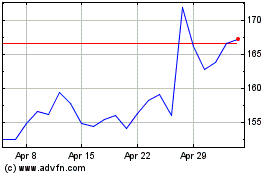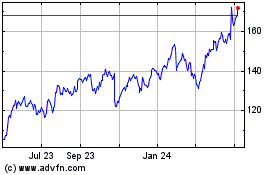By Ryan Tracy
YouTube will soon limit the data it collects on videos designed
for children to comply with a federal privacy clampdown, pleasing
consumer advocates but delivering a potential financial blow to
creators of free children's content on the video platform.
The unit of Alphabet Inc.'s Google recently began requiring the
makers of videos to designate whether the content they post is
targeted at children or a broader audience. YouTube will limit data
collection on videos geared toward children starting in early
January. A failure to properly designate videos could lead to
Federal Trade Commission fines for creators.
Videos made for children won't allow comments or other features
that can boost viewership, such as certain pop-ups that suggest
more content to watch. Most significantly, kid-targeted videos
won't carry personalized ads based on Google's data about the
viewer.
That would squeeze the ad dollars that Google shares with
creators. That, in turn, could result in less child-friendly
content on the platform. The dilemma highlights one of the
difficult trade-offs of life online: How to ensure privacy without
undermining a flourishing business model?
For YouTube, the changes attempt to balance concerns about
children' privacy with the company's desire to keep easy access to
all videos. Under federal law, websites directed to children must
get parental consent before collecting data about children.
YouTube now effectively will assume a child is watching if the
content is clearly directed at children -- limiting data collection
on those videos -- while still collecting data on all viewers,
including children, if the content is aimed at a broader
audience.
Supporting the changes are federal regulators, privacy advocates
and YouTube itself.
Even though some regulators and privacy advocates would prefer
farther-reaching curbs, many prefer the new system to the old one,
where children watched YouTube in droves and the platform treated
them no differently.
But worried creators are protesting the new system and urging
their fans to do the same, flooding the FTC with demands to leave
YouTube alone. The FTC has received more than 175,000 submissions
as part of a broad review of children' privacy rules -- a record
number.
The change is YouTube's response to FTC allegations the platform
has been tracking children' online activities in violation of the
1998 Children's Online Privacy Protection Act.
The FTC's allegations stemmed, in part, from the company's
compilation of "identifiers" that follow viewers online, building a
profile for advertising. If someone watches a toy video on YouTube,
for example, toy makers can chase them with ads across the web. The
FTC has said these identifiers constitute personal data under
COPPA, and that YouTube was using them to track viewers of
child-directed content.
YouTube has never admitted wrongdoing, but in September it paid
a $170 million fine to settle the allegations and agreed to create
a system to flag videos designed for children. YouTube has said the
changes will take effect in early January, without setting a date,
and has already begun rolling out some of them.
The FTC simultaneously is considering broader revisions to
children's privacy rules that apply to all websites -- and that has
stoked the debate.
YouTube doesn't break down its audience by age, but the platform
says more than two billion users visit a month. Popular kid-video
creators can make millions of dollars a year in sponsorships and
other revenue, but most fall short of making YouTube their primary
job. YouTube pays creators based on how many views -- and ads --
videos generate.
Children's videos will still have what is called contextual ads,
based on a post's content or other information, but YouTube has
told creators to expect less revenue without targeted ads based on
personal data.
Mike Moore in November posted a video warning the new system
might be "the end" of his family's "The Moore The Merrier Vlogs"
YouTube channel, where one of the most popular videos is his wife
cutting his children's hair. The new rules, he said, could cost him
revenue and the ability to see feedback from roughly 39,000
subscribers.
He now plans to keep posting while avoiding videos that could be
interpreted as solely for children, such as those only featuring
children. "We believe that our content is for a general audience,
but the government can come tell us, 'No, it's not,'" he said in an
interview.
"That's the scary part," he said.
Andrew Smith, director of the FTC's bureau of consumer
protection, said he is sympathetic to the concerns of creators but
also understands concerns about children' privacy. The FTC is
reviewing its rulebook "to strengthen the rule to make it work
better for children and parents," he said.
Privacy advocates worry the furor could lead regulators to
undermine protections for children online. Josh Golin, executive
director of the nonprofit Campaign for a Commercial-Free Childhood,
said YouTube has been a hugely popular online destination for young
children for years, without oversight to ensure it doesn't track or
manipulate them.
"Google should have been obeying the law and the creators
wouldn't be in this mess," he said.
A YouTube spokeswoman said "responsibility is our number one
priority at YouTube, and this includes protecting children and
their privacy."
YouTube has long said that its platform isn't for children under
13, and that it closes down accounts for users in that age group
when it discovers them. It operates a separate app for younger
children, YouTube Kids, which doesn't include personalized ads,
though the children's channel is far less popular.
However, the main YouTube platform consistently ranks among the
most popular brands with children under 13, according to academics
and market researchers. The FTC investigation unearthed evidence
that YouTube not only knew this, but also used it as a selling
point with advertisers.
"YouTube is unanimously voted as the favorite website of
children 2-12," read a slide the company presented to toy maker
Hasbro Inc., released as part of the FTC's complaint.
Meanwhile, some critics say that by making creators designate
their videos' audience, YouTube is effectively shifting
liability.
Jeremy Johnston, whose family-oriented J House Vlogs channel has
nearly 2 million subscribers, said, "YouTube and the FTC entered
into a settlement that I feel in a lot of ways throws creators
under the bus."
Write to Ryan Tracy at ryan.tracy@wsj.com
(END) Dow Jones Newswires
December 30, 2019 05:44 ET (10:44 GMT)
Copyright (c) 2019 Dow Jones & Company, Inc.
Alphabet (NASDAQ:GOOGL)
Historical Stock Chart
From Mar 2024 to Apr 2024

Alphabet (NASDAQ:GOOGL)
Historical Stock Chart
From Apr 2023 to Apr 2024
